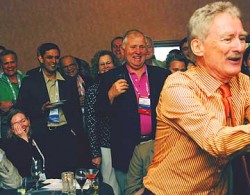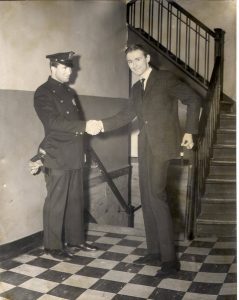
I love to look at Bambi’s Twitter communication. Short snappy funny bitchy snarky bright messages 140 characters long. I envy her exchanges. I wish I had a circle of friends who shared every thought the way Twitter was meant to be. Not as an extension of of our marketing work, but just simple fun exchanges of what we are doing at the moment with no intent to move a subliminal advertising message. Is that possible today among busy people?
But then the reservations sneak up on me. First and foremost suspicion. Our work is sometimes secretive and competitive, both in the speaker arena, and in law enforcement circles. Who said what to whom, who are your sources, where am I performing, for whom, who was the event producer, what’s my next project, how far along is it, what television show or film project am I involved in, who are the bad guys who speak to me, what political party dislikes my agenda, who or which corporation will be hurt by some of my projects? These are my first thoughts and it is just the beginning of a much longer list of questions I must ask myself before I reveal or write about daily activities. Chatting about our daily agenda when it works well, or when we have hurdles nearly always reveals information, inside information which can be taken advantage of, or even be indirectly used against us.
It’s called competitive intelligence; all major corporations are involved in it. On the murky side it’s actually industrial espionage, and on the opposite side of the pendulum’s swing it’s databasing/gathering of all the available information, gleaning golden nuggets from public records, pouring over news media, reading blogs, attending trade events, and talking to key personnel. Process the information and you have a pretty good idea of where your competition is, and even what they are soon capable of. Raw data is everywhere and when analyzed well you have a nearly perfect picture of what your competition is up to.

So writing Twitter snippets pretty much reveals where you are on your business plan. Cynical conclusion? You bet. Is there an alternative or a compromise to my dilemma? I’m as busy as ever, or maybe even more so today than in years past, partly because as we build on our expertise, we get more strange proposals and global inquiries, all requiring our serious attention. You can say that I’m still in the midst of it all. A million projects which can go either way—success or failure. But I do wish I could take another tack and be more open, reflective, or philosophical, and closer to my friends who I really enjoy hanging with. To constantly be secretive and cautious is something that goes against my nature and yet in the last ten years it has become the norm.
During the coming summer months I hope to share some of my thoughts and observations in my two industries: the event world and keynote speaking in an ever more hostile attitude to events and pseudo-motivational speakers.
We’ve just finished presenting at California’s annual Tourism Safety and Security Conference in Anaheim (as keynote speaker), and at a corporate event at Mandalay Bay for the Gartner conference. In the next couple of weeks we’ll be doing a developers forum for Microsoft in Slovenia, a chartered cruise in Alaska, and a preliminary film project in Rome. Throw in a Singapore film project, an HBO project, and a theater show in Dubai, and you get the picture; where to find time to write blog posts, Twitters, and still smell the roses and enjoy some wine.
I invite other entertainers, speakers, event producers or security professionals who read this to share their views. Let me know if I am alone in my paranoid world of obsessive suspicion.





6 Comments
[…] three weeks after I wrote my own blog post, Business Week (May 21) dedicated its main theme, cover page, and several articles to the same […]
I’d like to argue that Web 2.0 is largely a myth above and beyond being a buzzword created by T O’R. But this isn’t the place to do it. I will say blogs and twits are clumsy communicators at best. They’re essentially broadcasters with limited benefit from any ‘feedback’ possibilities. Communication? The net’s always had that. IRC, IM, et al. But I think people like to go to Hyde Park Corner at times.
You’re not alone. To competition and espionage you can add stalking. I was involved with the Cyber Angels in the early web days. Then there’s this – not at all atypical.
http://www.wired.com/politics/law/news/2000/03/35245
It’s just as you say/suspect: they can pick up anything from anything. And continually do. Stay paranoid and stay safe. Both of you!
Great photo Bob!
Keep your suspicious attitude, it’s part of your charm.
As a marketing consultant, I’m hearing many CEOs echo similar concerns about the new social media (Twitter, FB, LinkedIn, etc). How much to tell? How to control (usually younger) employees who tweet like they drink coffee? How to make time to do this? and why? Yet when companies like Expedia and The Mayo Clinic are blogging and tweeting, I advise my clients to at least look at what they’re doing to see what can be learned from “lurking.” Web 2.0 is about creating a dialogue with your customers/clients/fans, just as you are doing when you ask “I invite other entertainers, speakers, event producers or security professionals who read this to share their views. Let me know if I am alone in my paranoid world of obsessive suspicion.” This is a good thing.
There are a lot of things you can tweet/blog about without “giving up secrets.” Your upcoming trip to Slovenia, for example: Where is it? How do you get there? What’s the food like there? If it’s spicy, are you a fan of spicy food? Answering these kinds of questions (in a p.r. correct way, of course) positions you as a more relatable person. It makes it fun to follow you.
I recently tweeted about my personal speaking peeve: supposedly professionals–like a Vegas entertainer who shall remain unnamed–who when they present say “um” every other word.
Hope this helps raise your comfort level with the new social media. It does offer a wonderful opportunity for public relations at a very low, almost non-existant financial investment.
A family member recently asked Bob how he was at keeping secrets. While he hemmed and hawed, I interrupted with a splayed hand up. “He’s a 5.” On a scale of one to ten, I meant. Bob didn’t argue the point. But I guess that’s why he can’t trust himself to be a Twitter-user. He might spill his own secrets.